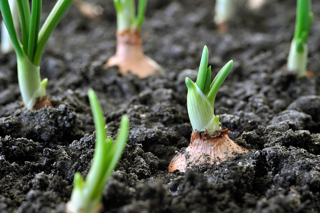Transitioning to Organic Foods for the New Year

As January 1st creeps closer, New Year’s resolutions become a recurring thought in everyone’s mind. The arrival of the New Year has the ability to make most people look back at their year and contemplate what made them happy, what took up too much space and time, what was beneficial, and what could have been improved. In doing so, you can then plan out what you want the coming year to contain. While most of us go about things this way, it is always comforting to remember that you do not need to wait for the calendar to land on January 1st in order to spark change in your life. You can do a full 180 whenever you desire.
New Year’s resolutions (or any day resolutions) can pertain to anything, but most often than not the focus is on making healthier choices. This year, consider the integration of organic foods into your diet as a way of making you a healthier and more contented person.
An agricultural product is considered to be organic if it is grown and processed in a certain way that is in accordance with the Canadian Organic Standards, which does not permit the use of synthetic pesticides, synthetic fertilizers, sewage sludge, genetically modified organisms, ionizing radiation, growth hormones, and antibiotics.
The way in which agricultural products are grown and produced have profound impacts on both your health and the environment, which is why it is important to stay informed on the production and manufacturing process involved with anything that you frequently purchase.
Organic food and farming practices adhere to standards that are significantly different from conventionally-grown food. These differences can impact your health and the environment.
- Organic products are grown with a significant reduction in the use of chemicals: Synthetic pesticides and fertilizers, as well as hormones and antibiotics that are commonly used in conventional agriculture, end up accumulating in our bodies when we consume these products. Studies have already suggested that synthetic pesticides can cause damage to the human body and promote illnesses. The prohibition of synthetic pesticides, synthetic fertilizers, hormones, and antibiotics in certified organic products means that you are choosing a healthier and safer option.
- Organic farming is better for the environment when compared to conventional farming practices: Chemicals used in conventional agriculture have the ability to harm the surrounding environment by contaminating nearby aquatic systems, degrading soil quality, and negatively impacting wildlife. By switching to organic, you are supporting farming practices that preserve the environment. Soil quality is promoted, wildlife diversity is protected, and weeds and pest populations are controlled by using a number of mechanical, biological, and ecological methods.
- Organic products do not contain GMOs: Organic standards do not permit the use of genetically modified organisms as seeds, as livestock feed, or as an ingredient in organic products. So, if you are worried about GMOs, you can avoid them easily by choosing organic over conventional.
Becoming Organic:
If you would like to integrate more organic foods into your diet this year, try to:
- Remember to check for the Canada Organic Logo. This logo signifies that the product has been certified according to the Canadian Organic Standards.

- Slowly begin to purchase organic foods at your grocery store, farmers’ market, health food store, or food-box delivery programs. As time goes on, attempt to purchase more organic foods rather than non-organic ones, until you reach a level you feel comfortable and content with.
- Support local organic farms, which can be done by frequenting your local farmers’ market.
- Get inspired: look up recipes that are made with organic ingredients, or go ahead and prepare an old family recipe by using only organic ingredients.
Organic Recipes:
For those transitioning to a more organic diet, we highly recommend taking a look at the following website: https://choosecanadaorganic.ca/findrecipes/. The recipes displayed on this website are all organic, and include recipes for breakfast, lunch, dinner, dessert, and snacks.

